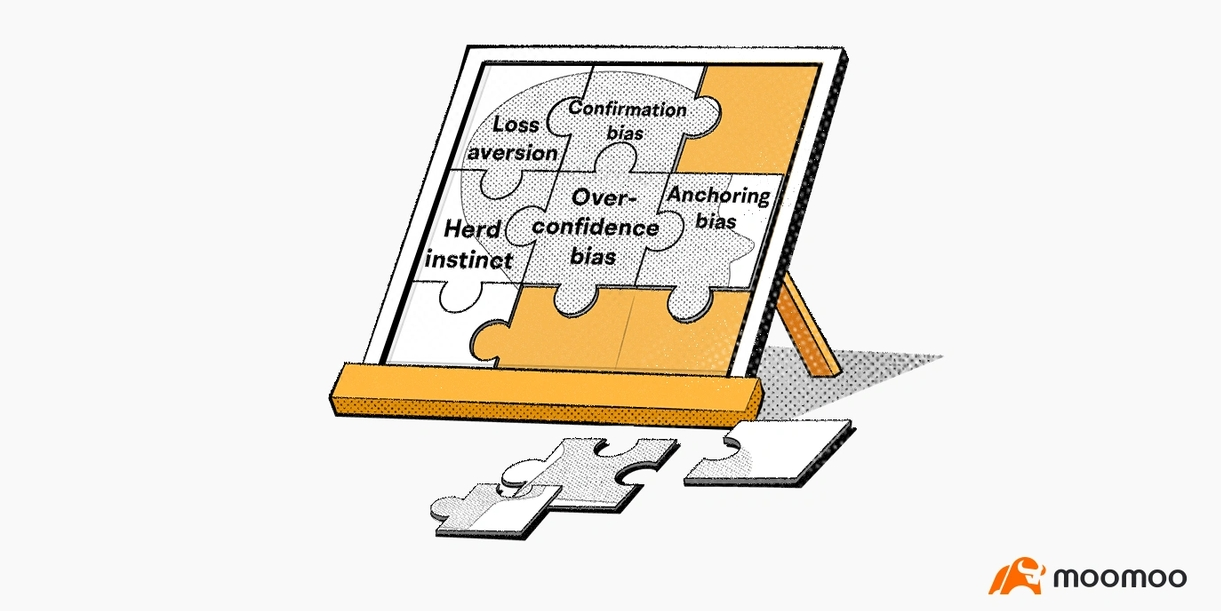In the world of investing, emotions and cognitive biases often influence our decisions. Understanding these psychological factors can significantly enhance your investment strategy. Behavioral finance sheds light on how to identify and overcome these biases, helping you make smarter investment choices. Here are 5 common behavioral biases and how to overcome them.
1. Loss Aversion
What it is: Loss aversion occurs when the pain of losing money is stronger than the pleasure of gaining it. Investors often prefer avoiding losses over acquiring equivalent gains.
How to overcome it: Focus on a long-term investment strategy to mitigate the emotional impact of short-term losses. Diversify your portfolio to spread risk and reduce the urge to constantly monitor your investments. By checking your portfolio only once or twice a year, you can avoid emotional reactions that may lead to poor decisions.
2. Home Bias
 What it is: Home bias is the tendency to favor investments from one's own country over those from foreign markets. This can lead to an overly concentrated portfolio.
What it is: Home bias is the tendency to favor investments from one's own country over those from foreign markets. This can lead to an overly concentrated portfolio.
How to overcome it: Aim for a globally diversified portfolio to spread risk and capture opportunities from different markets. Research international stocks, bonds, and other assets to ensure a balanced investment approach. Consider using global index funds or exchange-traded funds (ETFs) to easily diversify internationally.
3. Herd Instinct
What it is: Herd instinct is the tendency to follow the actions of a larger group, often leading to buying or selling stocks based on what others are doing, rather than conducting your own analysis.
How to overcome it: Conduct independent research and rely on your own analysis. Trust your judgment and avoid making impulsive decisions based on market trends or rumors. Remember that following the crowd can often lead to buying overvalued stocks or selling undervalued ones, which can negatively impact your investment returns.
4. Overconfidence Bias
What it is: Overconfidence bias is the tendency to overestimate one’s knowledge and abilities, leading to excessive risk-taking. This can result in poor investment choices and significant losses.
How to overcome it: Stay humble and recognize the limits of your knowledge. Diversify your portfolio to mitigate risk and consider seeking advice from financial professionals. Regularly review and adjust your investment strategy based on objective data and market conditions.
5. Confirmation Bias
What it is: Confirmation bias is the tendency to favor information that supports your existing beliefs and ignore information that contradicts them. This can lead to a skewed perception of reality and poor investment decisions.
How to overcome it: Actively seek out diverse perspectives and consider information that challenges your views. Evaluate your investments objectively and be open to changing your strategy based on new information. By considering different viewpoints, you can make more informed and balanced investment decisions.
Recognizing and understanding these common behavioral biases is the first step towards making more rational and informed investment decisions. By being aware of these psychological traps, you can develop strategies to minimize their impact and improve your long-term financial outcomes.
投資の世界では、感情や認知バイアスが意思決定に影響することがよくあります。これらの心理的要因を理解することで、投資戦略を大幅に強化することができます。行動ファイナンスは、これらのバイアスを特定して克服する方法に光を当て、より賢い投資選択をするのに役立ちます。ここでは、よくある5つの行動バイアスとその克服方法を紹介します。
1。損失回避
それは何ですか:損失回避は、お金を失うことの苦痛がそれを得る喜びよりも強いときに起こります。投資家は多くの場合、同等の利益を得るよりも損失を避けることを好みます。
それを克服する方法:短期的な損失による感情的な影響を軽減するために、長期的な投資戦略に焦点を当ててください。ポートフォリオを多様化してリスクを分散させ、常に投資を監視したいという衝動を減らしましょう。年に1、2回だけポートフォリオをチェックすることで、不適切な決断につながる感情的な反応を避けることができます。
2。ホームバイアス
 それは何ですか:ホームバイアスとは、海外市場からの投資よりも自国からの投資を優先する傾向です。これにより、ポートフォリオが過度に集中する可能性があります。
それは何ですか:ホームバイアスとは、海外市場からの投資よりも自国からの投資を優先する傾向です。これにより、ポートフォリオが過度に集中する可能性があります。
それを克服する方法:リスクを分散し、さまざまな市場から機会を獲得するために、グローバルに分散されたポートフォリオを目指してください。バランスの取れた投資アプローチを確保するために、国際株式、債券、その他の資産を調査してください。海外への分散を容易にするために、グローバル・インデックス・ファンドまたは上場投資信託(ETF)の使用を検討してください。
3。群れの本能
それは何ですか:群れの本能は、より大きなグループの行動に従う傾向であり、多くの場合、自分で分析を行うのではなく、他の人の行動に基づいて株を売買することになります。
それを克服する方法:独立した調査を行い、あなた自身の分析に頼ってください。自分の判断を信じて、市場動向や噂に基づいて衝動的な意思決定をしないでください。群衆を追いかけると、過大評価されている株を買ったり、過小評価されている株を売ったりすることが多く、投資収益に悪影響を及ぼす可能性があることを覚えておいてください。
4。自信過剰バイアス
それは何ですか:自信過剰バイアスとは、自分の知識や能力を過大評価し、過度のリスクテイクにつながる傾向です。これにより、投資の選択肢が悪くなり、大きな損失が発生する可能性があります。
それを克服する方法:謙虚さを保ち、知識の限界を認識してください。リスクを軽減するためにポートフォリオを多様化し、金融専門家にアドバイスを求めることを検討してください。客観的なデータと市場の状況に基づいて、投資戦略を定期的に見直し、調整してください。
5。確証バイアス
それは何ですか:確証バイアスとは、既存の信念を裏付ける情報を好み、それと矛盾する情報を無視する傾向です。これにより、現実に対する認識が歪み、投資判断が悪くなる可能性があります。
それを克服する方法:積極的に多様な視点を求め、自分の意見に異議を唱える情報を検討してください。投資を客観的に評価し、新しい情報に基づいて戦略を変更しても構いません。さまざまな視点を検討することで、より多くの情報に基づいたバランスの取れた投資判断を下すことができます。
これらの一般的な行動バイアスを認識して理解することが、より合理的で情報に基づいた投資判断を行うための第一歩です。これらの心理的な罠に気づくことで、その影響を最小限に抑え、長期的な財務成果を向上させるための戦略を立てることができます。

それは何ですか:ホームバイアスとは、海外市場からの投資よりも自国からの投資を優先する傾向です。これにより、ポートフォリオが過度に集中する可能性があります。


